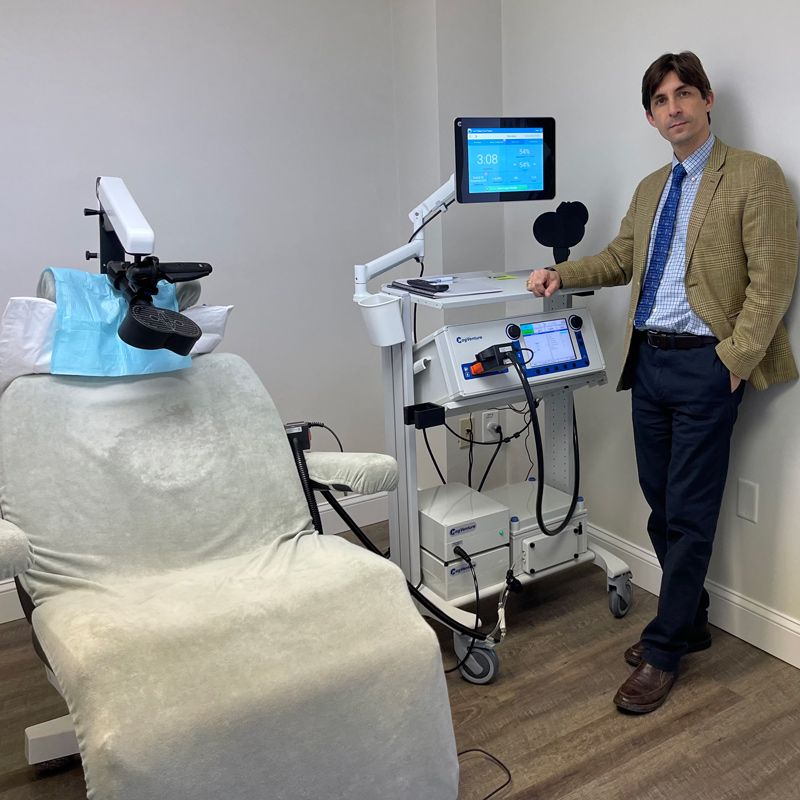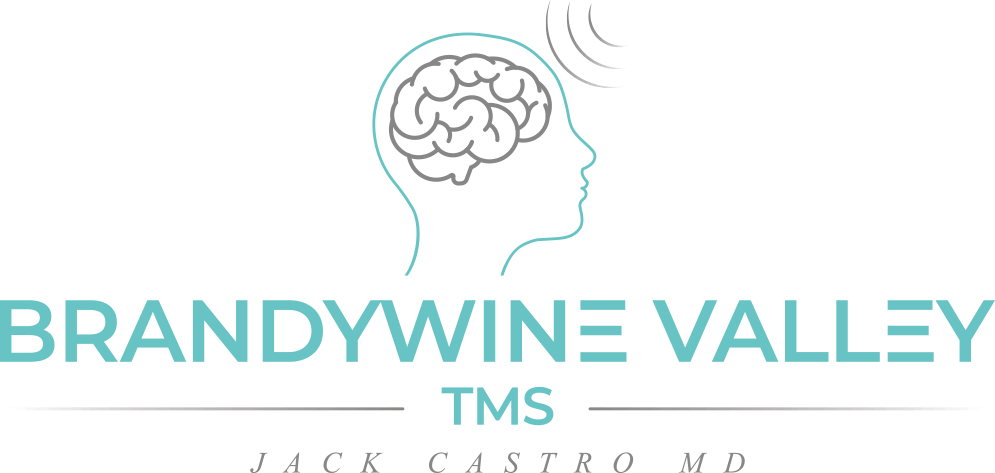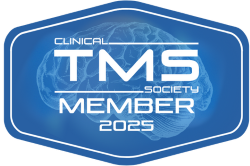TMS Therapy FOR DEPRESSION IN WILMINGTON DELAWARE
At Brandywine Valley TMS, we are committed to supporting you along your journey toward regaining mental wellbeing. If you’re struggling with depression or a related mental health issue, TMS therapy may be the solution you’ve been longing for. You deserve to feel like your best self and TMS can help.
Non-invasive. Non-sedative. FDA-Approved. Minimum side effects.
NAVIGATION LINKS
REQUEST A CONSULTATION
It's important to know that you are not alone. Get help with depression today!

TMS THERAPY SUPPORTS MENTAL WELLNESS
- Depression
- Lack of Joy
- Sadness and Despair
- Low Mood
- Lethargy
- Insomnia
- Oversleeping
- Social Isolation
- Self-Harm
- Substance Abuse
- Suicidal Ideation
- Alcoholism
LOCAL TO DELAWARE?
LEARN HOW TMS THERAPY TREATMENT CAN HELP YOU
This non-invasive treatment involves electrical coils pulsating repeatedly, stimulating nerve cells and modulating brain activity. These pulse repetitions change the efficiency of neurons in your brain, which reduce depression symptoms and other adverse mental health symptoms. Research shows it alleviates these symptoms by regulating the prefrontal cortex in the brain which regulates mood, thoughts, and behaviors. Brandywine Valley TMS is a leading provider of TMS for depression and anxiety. Our TMS therapy treatment offers hope to many people with hard-to-treat symptoms, even TRD.
Brandywine Valley TMS is one of the best outpatient mental health clinics in Wilmington, offering an affordable and accessible option for those seeking mental health care. We provide a comfortable and confidential setting where individuals can address their mental health needs.
During the late 1990s, researchers from across the globe published over 20 randomized, controlled trials studying TMS as a treatment for depression. Today, TMS research grows more and more robust, highlighting the wide-ranging benefits of TMS, for depression and beyond. TMS is taking the mental health world by storm and for good reason. If you or someone you know is struggling with depression and is tired of dealing with medication side effects, TMS may be the answer.
Magnetic therapy has become an increasingly popular method for treating a variety of mental health conditions, including depression, OCD, and anxiety. Transcranial Magnetic Stimulation (TMS) is a type of magnetic therapy that has been found to be particularly effective for these conditions. By using electromagnetic pulses, TMS therapy can help regulate the brain's activity and reduce symptoms such as intrusive thoughts and repetitive behaviors. Similarly, TMS therapy for anxiety can help target areas of the brain responsible for regulating emotions and alleviate symptoms such as racing thoughts and constant worry. For those struggling with these conditions, magnetic therapy such as TMS can provide a non-invasive, drug-free treatment option that shows promising results.
TMS therapy continues to help thousands of people every day to regain their lives through the mental health support they deserve.
What to Expect During a TMS Therapy Session
A small headpiece will be placed atop your head during a TMS session. Then, an electromagnetic coil hovers above the front area of your head and transmits pulsating magnetic fields. This function is similar to that of an MRI, but on a much, much smaller scale. These magnetic pulses reach about two to three centimeters into the brain to activate neurotransmitters such as serotonin, dopamine, and norepinephrine.
Transcranial magnetic stimulation (TMS) is a non-invasive procedure gaining popularity as a treatment option for individuals struggling with depression, obsessive-compulsive disorder (OCD), and anxiety. This innovative technique uses magnetic fields to stimulate specific areas of the brain, offering potential relief and improved mental well-being. With its promising results, TMS has become a viable therapeutic approach for those seeking effective solutions to manage their symptoms. These bodily chemicals are often out of balance when a person suffers from adverse mental health symptoms, and TMS therapy's functionality can help bring everything back into order. These pulses do not directly affect the whole brain. Rather, they affect only the area directly beneath the treatment coil.
Is TMS the Same as rTMS?
Confusion often arises when individuals search the Internet to learn about the different types of TMS. If you are seeking treatment for depression, you will be receiving TMS or rTMS - it’s the same service. Nowadays the terms TMS and rTMS are used interchangeably. The “r” refers to the “repetitive” nature in which the electromagnetic pulses are provided. These pulses are administered in bundles, each bundle is referred to as a“train of pulses”. The sound of the train of pulses is similar in frequency to that of a wood pecker drilling on a tree. See the brief video we've uploaded here for an example of rTMS.
Other types of TMS are single pulse (sTMS) and paired pulse (ppTMS) (1). These TMS modalities have applications in the neuro-diagnostic arena such as nerve conduction studies in multiple sclerosis (2) or to map brain regions such as Broca’s area for research purposes (3).
Over time, rTMS became a term to differentiate therapeutic TMS from diagnostic TMS, but when we talk about clinical applications of TMS nowadays, the two have become synonymous. Frequently, the r is dropped and we just talk about TMS, although in the background there is also sTMS and ppTMS.
rTMS Sample Video
This is a video of Dr. Amanda Castro undergoing rTMS Therapy in October 2022 when she was approximately 16 weeks pregnant. Click here to meet baby Daniela. Dr. Amanda Castro does not have depression but she and her husband Dr. Jack Castro were adjusting and testing the practice’s Magventure TMS system. TMS is safe in pregnancy, click here to learn more.
References for rTMS vs TMS
(1) Clin Neurophysiol. 2021 Oct;132(10):2639-2653. doi:10.1016/j.clinph.2021.06.014.Epub 2021 Jul 6.
(2) https://doi.org/10.1155/2019/6430596
(3) Brain Struct Funct. 2018 Apr;223(3):1297-1312. doi: 10.1007/s00429-017-1550-8. Epub 2017 Nov 7.
What Does TMS Feel Like?
In the majority of TMS Therapy sessions, patients report feeling perfectly at ease, if not completely relaxed. Some people may feel a light tapping sensation, but this feeling typically dissipates once a person grows accustomed to treatment.
While TMS is a safe, evidence-based treatment, it is not right for everyone. Always consult with our care team prior to beginning a new treatment. Any and all concerns will be addressed during an initial consultation. Please watch the two example videos in this section from Mike and Becky - two Brandywine Valley TMS patients talking about TMS therapy.
Experience the Benefits of TMS Therapy Today
TMS Therapy is a non-invasive, non-sedative, FDA-approved treatment with little to no side effects. Unlike mental health medications that can often cause a myriad of unwanted side effects, TMS therapy allows you to feel like your best self immediately after treatment sessions. Some patients begin to notice positive changes by the third week of treatment, sometimes much sooner.
In fact, TMS is well-known for being an exceptional option for those who don't respond well to mental health prescriptions. Why? Because research often associates an under-active prefrontal cortex with depression, and other mental health conditions, and TMS boosts this functioning in a new, and effective, way.
The effective, safe, FDA-approved care you deserve.

CONDITIONS TMS THERAPY CAN TREAT
Are you wondering which conditions we commonly help patients with? We provide assistance for those struggling to quit smoking, as well as those recovering from substance abuse or alcohol withdrawal. If you're experiencing low mood or energy levels, insomnia or oversleeping, social isolation, or any of the following conditions – we can help.
Have questions? We can help.

DEPRESSION

ANXIETY

TRD

PTSD


